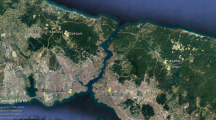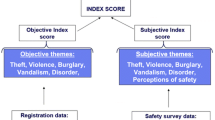Abstract
There are concerns that responses to urban safety are gradually reinforcing socio-spatial inequalities, with suggestions emphasising community-institutional collaborations for promoting safer urban communities. Yet, the quotidian realities that underpin residents’ lived experiences are scantly used in urban safety strategies, despite that official crime data are often unavailable and outdated for many urban communities of the global south. Based on in-depth interviews with residents and officials in the Sekondi-Takoradi Metropolis, this paper explores residents’ everyday urban safety perceptions and responses to unravel their safety realities and to offer insights for building safer communities. Findings show that safety perceptions and responses permeate residents’ everyday urban life and are enmeshed within socio-economic inequalities and the ethos of city planning and security agencies. This paper argues that planning and other public authorities need a strategic shift that valorises the everyday as a crucial source of knowledge on the socio-economic and spatial conditions that undergird residents’ everyday experiences of safety and as a basis for collaborative safety strategies.


Similar content being viewed by others
References
Albrechts, L. (2013). Reframing strategic spatial planning by using a coproduction perspective. Planning Theory, 12(1), 46–63.
Amin, A. (2014). Lively Infrastructure. Theory, Culture & Society, 31(8), 137–161.
Amin, A., & Cirolia, L. R. (2018). Politics/matter: Governing Cape Town’s informal settlements. Urban Studies, 55(2), 274–295.
Anwar, N. H., Sawas, A., & Mustafa, D. (2020). ‘Without water, there is no life’: Negotiating everyday risks and gendered insecurities in Karachi’s informal settlements. Urban Studies, 57(6), 1320–1337.
Barac, M. (2011). Place resists: Grounding African urban order in an age of global change. Social Dynamics, 37(1), 24–42.
Beck, U. (2000). Risk society revisited: Theory, politics and research programmes. In B. Adam, U. Beck, & J. van Loon (Eds.), The Risk Society and Beyond: Critical Issues for Social Theory (pp. 211–229). SAGE Publications Ltd.
Bénit-Gbaffou, C., & Oldfield, S. (2011). Accessing the State: Everyday practices and politics in cities of the south. Journal of Asian & African Studies, 46(5), 445–452.
Bennett J (2010) Vibrant matter: A political ecology of things. Durham: Duke University Press.
Braun, B., & Whatmore, S. J. (eds). (2010). Political matter: technoscience, democracy, and public life. University of Minnesota Press
Busia, K.A. (1950). A report on a social survey of Sekondi-Takoradi. London, Crown, Agents.
Castán Broto, V., & Neves Alves, S. (2018). Intersectionality challenges for the co-production of urban services: Notes for a theoretical and methodological agenda. Environment and Urbanization, 30(2), 367–386.
Cirolia, L. R., & Scheba, S. (2019). Towards a multi-scalar reading of informality in Delft, South Africa: Weaving the ‘everyday’ with wider structural tracings. Urban Studies, 56(3), 594–611.
Clancey, G., Lee, M., & Crofts, T. (2012). ‘We’re not Batman’ — Roles and expectations of local government community safety officers in New South Wales. Crime Prevention and Community Safety, 14(4), 235–257.
Cobbinah, P. B., & Darkwah, R. M. (2017). Toward a more desirable form of sustainable urban development in Africa. Null, 36(3), 262–285.
Cobbinah, P. B., Erdiaw-Kwasie, M., & Amoateng, P. (2015). Africa’s urbanisation: Implications for sustainable development. Cities, 47, 62–72.
Creswell JW (2014) Research design: Qualitative, quantitative, and mixed methods approaches. SAGE Publications.
De Boeck, F. (2015). Divining” the city: Rhythm, amalgamation and knotting as forms of “urbanity. Social Dynamics, 41(1), 47–58.
De Satgé R and Watson V (2018) Urban planning in the global south: Conflicting rationalities in contested urban space: Palgrave Macmillan.
Dierwechter, Y. (2004). Dreams, bricks, and bodies: Mapping ‘neglected spatialities’ in African Cape Town. Environment and Planning A, 36(6), 959–981.
Ebu I O (2020). Spatial analysis of crime in the Sekondi-Takoradi Metropolis. Thesis: University of Cape Coast. https://ir.ucc.edu.gh/xmlui/handle/123456789/4693. Accessed Online: August 10, 2021.
Ernstson H (2013) Re-translating nature in post-apartheid Cape Town: The material semiotics of people and plants at Bottom Road. Actor-Network Theory for Development: Working Paper Series: 1–35.
Farooqui, U. (2020). Politics of neutrality: Urban knowledge practices and everyday formalisation in Karachi’s waterscape. Urban Studies, 57(12), 2423–2439.
Fiave, R.E. (2017). Sekondi-Takoradi as an Oil City. Geography Research Forum, 37(2), 61–79
Fledderus, J., Brandsen, T., & Honingh, M. (2014). Restoring trust through the co-production of public services: A theoretical elaboration. Public Management Review, 16(3), 424–443.
Frimpong L K. (2021). Do access control features reduce perceived risk of property victimization? Insights from residential neighbourhoods in Sekondi-Takoradi, Ghana. SN Social Science. https://doi.org/10.1007/s43545-021-00075-z
Frimpong LK (2020) Fear of crime in the Sekondi-Takoradi Metropolis: Exploring the role of the built environment and community social organization. University of Ghana. Accra.
Frimpong, L. K. (2016). Geography of fear of crime: Examining intra-urban differentials in the Sekondi-Takoradi Metropolis, Ghana. Ghana Journal of Geography, 8(1), 81–104.
Frimpong, L. K., Oteng-Ababio, M., Owusu, G., & Wrigley-Asante, C. (2018). Collective efficacy and fear of crime in urban neighbourhoods in Ghana. Safer Communities, 17(3), 167–181.
Frimpong, L. K., Oteng-Ababio, M., Owusu, G., & Wrigley-Asante, C. (2019). Public confidence in the police: Tests of instrumental and expressive models in a developing country city. Police Practice & Research, 20(2), 139–155.
Gaonkar, D. P., & Povinelli, E. A. (2003). Technologies of public forms: Circulation, transfiguration, recognition. Public Culture, 15(3), 385–397.
Gardiner M (2000) Critiques of everyday life: An introduction. London: Routledge.
Garofalo, J. (1981). Fear of crime: Causes and consequences. Journal of Criminal Law & Criminology, 72, 839–857.
Harvey, C. A., Chacón, M., Donatti, C. I., Garen, E., Hannah, L., Andrade, A., et al. (2014). Climate-smart landscapes: Opportunities and challenges for integrating adaptation and mitigation in tropical agriculture. Conservation Letters, 7(2), 77–90.
Hou J (2018) Everyday and bottom-up: A counter-narrative of American city design: Springer International Publishing.
IDRC (2016). Safe and inclusive cities. Crime and the “poverty penalty” in urban Ghana. https://www.idrc.ca/sites/default/files/sp/Documents%20EN/idrc-crime-and-the-poverty-penalty-in-urban-ghana-letter-online-and-office-printing.pdf. Accessed 16 Apr 2019
Idriss M, Jendly M, Karn J and Mulone M (2010) International report on crime prevention and community safety: Trends and perspectives, 2010. Montreal: International Centre for the Prevention of Crime.
International Centre for the Prevention of Crime (2016) 5th International Report on Crime Prevention and Community Safety: Cities and the new urban agenda, 2016. Montréal: International Centre for the Prevention of Crime.
Jaglin, S. (2014). Regulating service delivery in southern cities: Rethinking urban heterogeneity. In S. Parnell & S. Oldfield (Eds.), The Routledge Handbook on Cities of the Global South (pp. 434–447). Routledge.
Johnson, R. (2002). Defending ways of life: The (anti-)terrorist rhetorics of Bush and Blair. Theory, Culture & Society, 19(4), 211–231.
Landman K (2012) Reconsidering Crime and Urban Fortification in South Africa; Reconsidering Crime and Urban Fortification in South Africa. Springer Netherlands.
Larkin B (2008) Signal and Noise: Media, Infrastructure, and Urban Culture in Nigeria. Durham: Duke University Press.
Larkin, B. (2013). The politics and poetics of infrastructure. Annual Review of Anthropology, 42, 327–343.
Latham, A., & McCormack, D. P. (2004). Moving cities: Rethinking the materialities of urban geographies. Progress in Human Geography, 28(6), 701–724.
Lefebvre H (1991) Critique of everyday life: Foundations for a sociology of the everyday. Verso.
Lemanski, C. (2006). Residential responses to fear (of crime plus) in two Cape Town suburbs: Implications for the post-apartheid city. Journal of International Development, 18(6), 787–802.
Margerum RD (2011) Beyond consensus: Improving collaborative planning and management. Cambridge, MA: MIT Press.
McFarlane, C., & Silver, J. (2017). The poolitical city: “Seeing sanitation” and making the urban political in Cape Town. Antipode, 49(1), 125–148.
Moran J (2005) Reading the eeryday. London: Routledge.
Muggah R (2012) Researching the urban dilemma: Urbanization, poverty and violence.
Obeng-Odoom, F. (2012). Political-economic origins of Sekondi-Takoradi, West Africa’s new oil city. Urbani Izziv, 23(2), 121–130.
Obeng-Odoom, F. (2014). Oiling the urban economy: Land, labour, capital and the State in Sekondi-Takoradi, Ghana. Routledge
Obeng-Odoom, F., Eltayeb ElHadary, Y. A., & Jang, H. S. (2014). Life within the wall and implications for those outside it: Gated communities in Malaysia and Ghana. Journal of Asian and African Studies, 49(5), 544–558.
Obeng-Odoom, F. (2017). The gated housing hierarchy. In Martin, F. & J. Arvanitakis (Eds.), Property, Place and Piracy (pp. 187–201). Routledge.
Okyere SA (2018) A Study on Socio-Spatial Structure and Community Management System in Abese Indigenous Quarter of La, Accra, Ghana. Rethinking Urban Informality and Informal Settlement Improvement. Osaka University: Osaka.
Oldfield, S., & Stokke, K. (2004). Building unity in diversity: Social movement activism in the Western Cape anti-eviction campaign. In R. Ballard, A. Habib, & I. Valodia (Eds.), Voices of protest: Social movements in post-apartheid South Africa (pp. 25–49). University of Kwazulu Natal Press.
Olivier de Sardan, J. (2011). The eight modes of local governance in West Africa; The eight modes of local governance in West Africa. IDS Bulletin, 42(2), 22–31.
Ostrom, E. (1996). Crossing the great divide: Coproduction, synergy, and development. World Development, 24(6), 1073–1087.
Oteng-Ababio, M. (2016). Beyond poverty and criminalization: Splintering youth groups and ‘conflict of governmentalities’ in urban Ghana. Ghana Journal of Geography, 8(1), 51–78.
Oteng-Ababio, M. (2018). ‘The oil is drilled in Takoradi, but the money is counted in Accra’: The paradox of plenty in the oil city, Ghana. Journal of Asian & African Studies, 53(2), 268–284.
Oteng-Ababio, M., Owusu, G., Wrigley-Asante, C., & Owusu, A. (2016). Longitudinal analysis of trends and patterns of crime in Ghana (1980–2010): A new perspective. African Geographical Review, 35(3), 193–211.
Overholtzer, L., & Robin, C. (2015). 1 The materiality of everyday life: An introduction. Archeological Papers of the American Anthropological Association, 26(1), 1–9.
Owusu, A. Y., Oteng-Ababio, M., Owusu, G., Wrigley-Asante, C., & Agyekum, M. W. (2019). Opening up or closing off: Urbanisation, violent crime, and the “poverty penalty” in Ghana’s four largest cities. In J. E. Salahub, M. Gottsbacher, J. de Boer, & M. D. Zaaroura (Eds.), Reducing Urban Violence in the Global South (pp. 40–66). Routledge.
Owusu, G., Oteng-Ababio, M., Owusu, A. Y., & Wrigley-Asante, C. (2016). Can poor neighbourhoods be correlated with crime? Evidence from urban Ghana. Ghana Journal of Geography, 8(1), 11–31.
Owusu, G., Wrigley-Asante, C., Oteng-Ababio, M., & Owusu, A. Y. (2015). Crime prevention through environmental design (CPTED) and built-environmental manifestations in Accra and Kumasi, Ghana. Crime Prevention & Community Safety, 4, 249.
Parks, R. B., Baker, P. C., Kiser, L., Oakerson, R., Ostrom, E., Ostrom, V., et al. (1981). Consumers as coproducers of public services: Some economic and institutional considerations. Policy Studies Journal, 9(7), 1001–1011.
Peck, J. (2015). Cities beyond compare? Regional Studies, 49(1), 160–182.
Perry, B., & Atherton, M. (2017). Beyond critique: The value of co-production in realising just cities? Local Environment: The Future of Sustainable Cities: Governance, Policy and Knowledge, 22, 36–51.
Pieterse, E. (2011). Grasping the unknowable: Coming to grips with African urbanisms. Social Dynamics, 37(1), 5–23.
Pratt, A. (2015). Formality as exception. Urban Studies, 56(3), 612–615.
Purcell, M. (2009). Resisting neoliberalization: Communicative planning or counter-hegemonic movements? Planning Theory (london, England), 8(2), 140–165.
Ronneberger, K. (2008). Henri Lefebvre and urban everyday life: In search of the possible. In Goonewardena, K, S. Kipfer, R. Milgrom, & C. Schmid (Eds.), Space, Difference, Everyday Life: Reading Henri Lefebvre (pp. 148–160). Routledge.
Rosen J and Painter G (2019) From citizen control to co-production: Moving beyond a linear conception of citizen participation. Journal of the American Planning Association: 50 Years since Arnstein's Ladder 85(3): 335–347.
Sampson, R. J. (2012). Great American City: Chicago and the enduring neighborhood effect. Chicago: University of Chicago Press
Schindler, S. (2017). Towards a paradigm of Southern urbanism. City, 21(1), 47–64.
Schuck AM (2019) Community policing, coproduction, and social control: Restoring police legitimacy. In: Anonymous Political Authority, Social Control and Public Policy. Emerald Publishing Limited.
Sekondi-Takoradi Metropolitan Assembly (2018) STMA Medium-Term Development Plan for 2018–2021. Sekondi-Takoradi: Sekondi-Takoradi Metropolitan Assembly.
Silver, J. (2014). Incremental infrastructures: Material improvisation and social collaboration across post-colonial Accra. Urban Geography, 35(6), 788–804.
Simone, A. (2004). People as infrastructure: Intersecting fragments in Johannesburg. Public Culture, 16(3), 407–429.
Simone A (2014) The missing people: Reflections on an urban majority in cities of the south. In: Parnell S and Oldfield S (eds) The Routledge Handbook on Cities of the Global South. Abingdon: Routledge.
Sowatey, E. A., & Atuguba, R. A. (2014). Community policing in Accra: The complexities of local notions of (in) security and (in) justice. In Albrecht, P. & H. M. Kyed (Eds.), Policing and the Politics of Order-Making (pp. 74–90). Routledge
Stanley, A. (2013). Natures of risk: Capital, rule, and production of difference. Geoforum, 45, 5–16.
Swyngedouw E (2004) Social power and the urbanization of water. Oxford: Oxford University Press.
Tankebe, J. (2008). Police effectiveness and police trustworthiness in Ghana: An empirical appraisal. Criminology & Criminal Justice, 8(2), 185–202.
Tulloch J and Lupton D (2003) Risk and everyday life. London: SAGE Publications Ltd.
UN-Habitat (2007) Enhancing urban safety and security: Global report on human settlements 2007. London: Routledge.
United Nations (2016). The World’s Cities in 2016. https://www.un.org/en/development/desa/population/publications/pdf/urbanization/the_worlds_cities_in_2016_data_booklet.pdf. Accessed 10 Nov 2018
Von Schnitzler, A. (2013). Traveling technologies: Infrastructure, ethical regimes, and the materiality of politics in South Africa South Africa. Cultural Anthropology, 28(4), 670–693.
Von Schnitzler A (2016) Introduction democracy’s infrastructure, apartheid’s debris. Princeton, NJ: Princeton University Press.
Watson, V. (2014). Co-production and collaboration in planning–The difference. Planning Theory & Practice, 15(1), 62–76.
Wrigley-Asante, C., Owusu, G., Oteng-Ababio, M., & Owusu, A. Y. (2016). Poverty and crime: Uncovering the hidden face of sexual crimes in urban low-income communities in Ghana. Ghana Journal of Geography, 8(1), 32–50.
Funding
Building a new generation of Academics in Africa “BANGA-Africa” with funding from the Carnegie Corporation of New York.
Author information
Authors and Affiliations
Corresponding author
Additional information
Publisher’s Note
Springer Nature remains neutral with regard to jurisdictional claims in published maps and institutional affiliations.
Rights and permissions
About this article
Cite this article
Frimpong, L.K., Okyere, S.A., Diko, S.K. et al. ‘Everybody is Taking Their Security in Their Own Hands’: Exploring Everyday Urban Safety Perceptions and Realities in Sekondi-Takoradi, Ghana. Urban Forum 33, 245–265 (2022). https://doi.org/10.1007/s12132-021-09443-7
Accepted:
Published:
Issue Date:
DOI: https://doi.org/10.1007/s12132-021-09443-7




